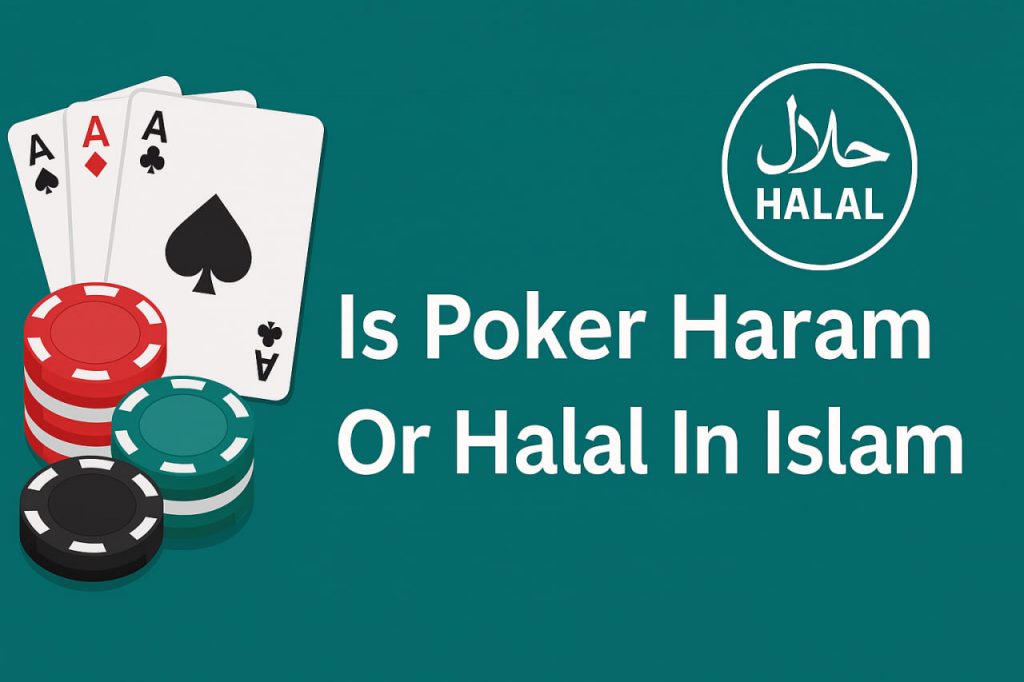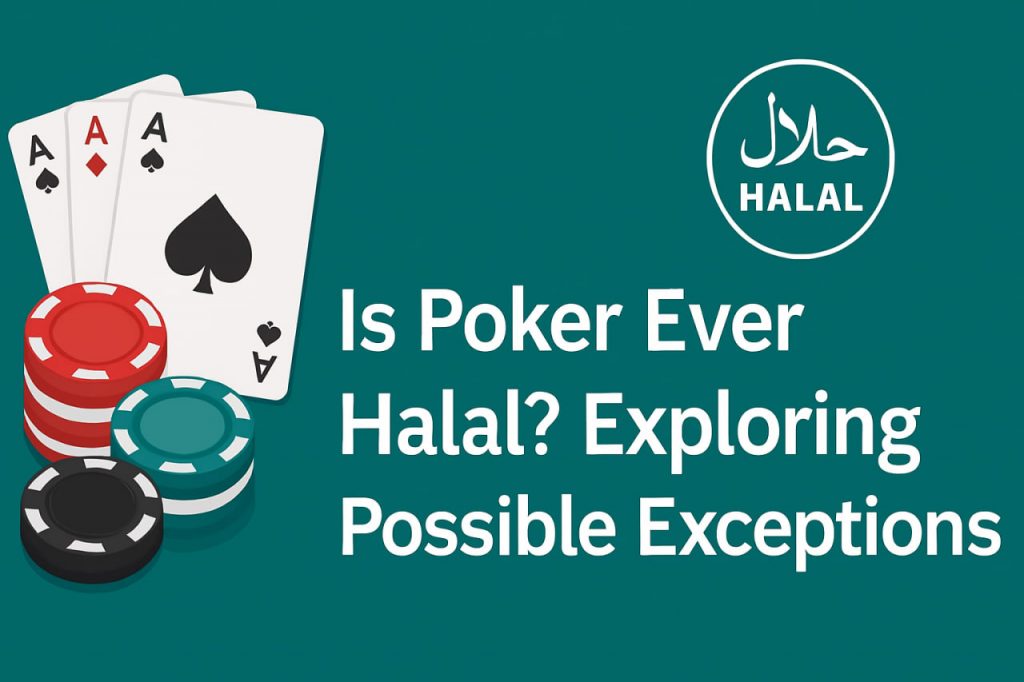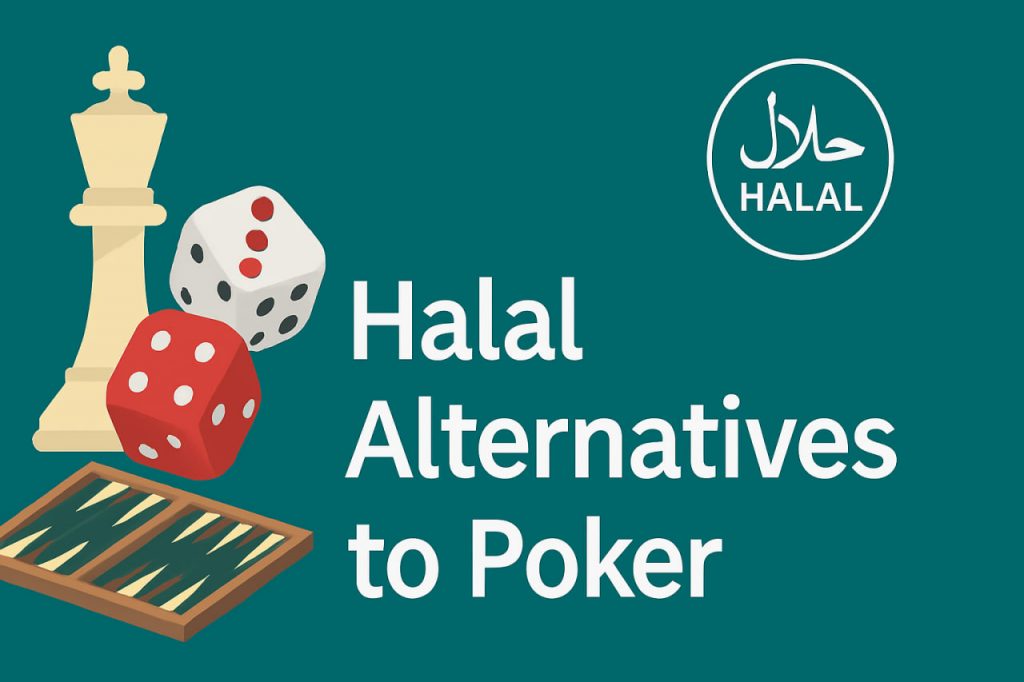Is Poker Haram or Halal in Islam?

Poker is a globally recognized card game, enjoyed by millions for its blend of skill, psychological strategy, and suspense. However, for followers of Islam, a critical religious question emerges: Is poker haram or halal in Islam? This question carries significant weight, as gambling and chance-based games are clearly discussed in Islamic jurisprudence and the Quran.
In this extensively detailed article, we will take a deep dive into the Islamic view on poker, examining whether it is considered haram (forbidden) or halal (permissible). We will analyze core Islamic teachings, share insights from classical and contemporary scholars, highlight the harms associated with poker, explore modern contexts such as online poker and televised tournaments, and consider alternatives that align with Islamic principles. We’ll also look at the psychological effects of gambling, the influence of poker on youth culture, and how Muslims living in non-Muslim societies can navigate environments where gambling is normalized. By the end, you’ll have a comprehensive understanding of the Islamic stance on this controversial game.
Understanding the Basics: What is Poker?
Poker is a card game that involves players competing against one another by betting based on the perceived value of their hand. While there are many variations, including Texas Hold’em, Omaha, and Seven Card Stud, all poker formats involve a blend of chance, psychological strategy, and mathematical skill.
Here are the most common poker formats:
- Cash Games – Players wager real money in each hand, and the chips represent actual currency. Players can join or leave at any time.
- Tournaments – Players pay a set entry fee and receive chips to compete. The goal is to accumulate all the chips and win a share of the prize pool.
- Sit-and-Go Games – A hybrid tournament format that starts as soon as a specific number of players register.
- Online Poker – Websites and apps offer poker games around the clock, involving real or virtual money.
- Home Games and Social Poker – Poker played among friends, sometimes for chips or friendly wagers, occasionally with no money involved.
- Poker as Entertainment – Televised poker tournaments and YouTube streams have helped glamorize the game, turning players into celebrities.
- Celebrity Poker – Involving actors, musicians, and influencers, these games promote poker as a stylish, elite hobby.
- Mobile Poker Apps – Easily accessible to youth, these apps introduce young audiences to the mechanics of gambling, often under the guise of harmless fun.
Poker also includes social aspects like bluffing, reading others’ body language, and adapting to rapidly changing odds, which make it psychologically thrilling. Despite the illusion of skill, the unpredictable outcomes and reliance on luck mean the game treads a fine line between competition and gambling.
Try Our Halal-Approved Poker Alternative
Traditional poker involves betting, bluffing for cash gain, and profiting through chance — all of which fall under the category of haram gambling in Islam. Our team has reviewed multiple poker-style games and selected a Shariah-verified alternative that removes real-money wagering while preserving the strategic, skill-based experience.
- ✔ Fully reviewed and Shariah-checked poker-style game
- ✔ No betting, no money stakes, no gambling-based profit
- ✔ A halal-friendly way to enjoy poker-style strategy and thinking
Disclaimer: This halal-friendly poker recommendation is based on our team’s Shariah analysis. For personal rulings, please consult a qualified Islamic scholar.
Islamic Perspective: Is Poker Haram?
The critical question of “is poker haram” must be examined through multiple lenses: Quranic verses, Hadith, Islamic jurisprudence, and scholarly consensus. Across all these sources, the ruling on poker, especially when money is involved, is overwhelmingly clear: poker is haram.
1. Gambling (Maisir) in the Quran
“O you who have believed, indeed, intoxicants, gambling, [sacrificing on] stone alters [to other than Allah], and divining arrows are but defilement from the work of Satan, so avoid it that you may be successful.” (Surah Al-Ma’idah 5:90)
The Quran firmly denounces gambling (maisir) as a satanic tool that leads people away from worship and promotes discord. Poker’s betting nature fits this definition exactly, as money is staked on uncertain outcomes. Many scholars equate poker to the same level of sin as alcohol and idolatry due to the moral and social damage it causes.
2. Addiction and Spiritual Harm
Poker can easily become addictive. The highs of winning and the thrill of bluffing may trigger the brain’s reward system, making people return again and again. Online accessibility amplifies this risk.
- Poker addiction can lead to significant debt and financial instability.
- Emotional distress, depression, and anxiety become commonplace.
- Addicted players often neglect prayer, spiritual growth, and responsibilities.
- The heart becomes attached to material gain and ego-driven competition, distancing itself from Allah and His guidance.
- Gambling disorders have been linked to increased risk of suicidal thoughts and family breakdown.
3. Time Wastage and Negligence (Laghw)
Poker is extremely time-consuming. Online games can stretch for hours, while live tournaments can last entire days. Islam encourages Muslims to use their time productively in the remembrance of Allah and the betterment of themselves and society.
“By time, indeed mankind is in loss, except for those who have believed and done righteous deeds…” (Surah Al-Asr 103:1-3)
Time spent chasing wins in poker could otherwise be invested in personal growth, ibadah (worship), charity, and family development.
4. Unethical Behavior
Bluffing is essential to poker. It is a form of deception that contradicts Islamic ethics, which value honesty, transparency, and integrity.
- Poker encourages manipulating others’ emotions.
- It rewards deceit and strategic dishonesty.
- Long-term exposure to such behaviors may influence a person’s character beyond the game.
- Islam teaches that even joking lies are discouraged. How much more then a game based entirely on misdirection?
5. Economic Exploitation (Gharar and Qimar)
Poker epitomizes gharar (excessive uncertainty) and qimar (wagering for gain), both of which are condemned in Islamic financial law.
- It is based on risk-taking with money for speculative returns.
- One player’s gain is another’s loss, unlike mutual profit in trade.
- It encourages a zero-sum mentality contrary to cooperation and fairness.
- The Islamic economic model promotes justice, transparency, and shared prosperity, none of which are found in poker environments.
Is Poker Ever Halal? Exploring Possible Exceptions

Some argue that poker can be halal if played without money or as a tool to enhance mental skills. These positions, while less extreme, are still fraught with risk.
1. Poker Without Betting
- Some play poker using chips with no real-world value.
- However, the structure mimics real gambling.
- Many such games transition into real-money versions.
- This gray area can lead to desensitization toward gambling.
- Children who play simulated gambling games are statistically more likely to engage in real gambling later.
2. Poker for Skill Development
- Poker involves strategy, memory, and calculation.
- Advocates claim it improves mental faculties.
- However, Islamic scholars warn that similar benefits can be gained from halal games like chess.
- The harmful framing and potential gateway to gambling overshadow educational value.
- Encouraging poker, even for cognitive training, may lead to future haram exposure.
3. Social Poker Among Friends
- Some families and friend groups engage in poker for fun.
- While there’s no money, the game still glorifies risk and bluffing.
- Over time, this may lead to curiosity about higher-stakes poker or online platforms.
- Peer pressure and competition may encourage players to “level up” their game into real betting.
Bottom Line: Most scholars agree that any game simulating gambling—even without actual money—poses spiritual and behavioral risks. It’s better to avoid such games altogether.
Is Poker Haram or Halal?
| Scenario | Description | Verdict | Reason |
|---|---|---|---|
| Poker with real money | Played in casinos, apps, or private rooms with bets | Haram | Involves maisir, gharar, addiction, unethical behavior |
| Free online poker | No money, but simulated gambling mechanics | Debated | Conditions player for real-money games, exposes to gambling culture |
| Social poker games | Among friends, no cash involved | Debated | Normalizes poker structure and risks developing gambling habits |
| Poker as a profession | Income derived from poker playing | Haram | Depends on luck, deceit, risk; not a halal source of livelihood |
| Poker in educational settings | Used for game theory or math | Debated | Intention matters, but setting still mimics haram environment |
| Poker in media & entertainment | Watching poker tournaments online/TV | Discouraged | Encourages admiration of gambling culture and materialism |
| Poker-based mobile games | Casual games with poker elements | Debated | Harmless on surface, but subtly promotes risk-based behavior |
| Poker-themed merchandise | Clothing, accessories with poker branding | Discouraged | Normalizes and glorifies gambling imagery and culture |
| Charity poker events | Fundraising using poker tournaments | Haram | Ends do not justify means; fundraising through haram means is not permissible |
Scholarly Opinions: What Do Experts Say?
Leading scholars across Sunni and Shia schools have issued clear rulings:
- Al-Azhar University: Declares poker with any form of betting as haram.
- Dar al-Ifta (Egypt): Playing poker with money or prizes falls under gambling.
- Mufti Menk: Warns Muslims to stay away from anything that mimics or encourages gambling.
- Islam Q&A (Shaykh Muhammad Salih al-Munajjid): Categorically considers poker haram, regardless of format.
- Sheikh Yusuf al-Qaradawi: Emphasized that games based on chance and financial speculation are haram.
- Imam Nawawi and Imam Ibn Qudamah: Also warned against wasting time and engaging in any form of gambling or imitation of it.
There is ijma’ (scholarly consensus) on the issue of gambling, and since poker fits the criteria of gambling, it falls under the same prohibition. When there is consensus among the scholars on an issue, it is considered binding in Islamic law.
Broader Spiritual and Social Implications
When asking is poker haram or halal in Islam, we must reflect on the Maqasid al-Shariah—the higher objectives of Islamic law:
- Preservation of Faith: Poker leads to spiritual neglect.
- Preservation of Intellect: Gambling clouds rational judgment.
- Preservation of Wealth: Players lose money with no value return.
- Preservation of Family: Poker can lead to family disputes, secrecy, and neglect.
- Preservation of Society: Gambling contributes to crime, corruption, and societal decay.
Poker harms not only individuals but also the fabric of Islamic society. It promotes greed, unhealthy competitiveness, and emotional detachment. With the growth of influencer culture and social media, youth are increasingly exposed to poker content glamorizing fast money, late-night gaming sessions, and luxury lifestyles funded by gambling winnings. This misleading portrayal distances them from Islamic values of hard work, humility, and lawful earnings.
Halal Alternatives to Poker

Islam promotes balance and encourages recreation that uplifts the body, mind, and soul. Muslims looking for engaging, stimulating activities can explore halal options, such as:
- Chess and logic-based board games
- Islamic-themed mobile games and quizzes
- Creative writing, poetry, or storytelling
- Physical sports like football, archery, or swimming
- Volunteering, charity work, or social activism
- Learning new skills (coding, design, calligraphy)
- Attending halaqas, Islamic workshops, and retreats
- Reading biographies of the Prophet Muhammad (PBUH) and companions
These alternatives foster creativity, strengthen bonds, and help fulfill personal and communal goals in accordance with Islamic values. Leisure time in Islam is not condemned but should be spent in ways that bring benefit and align with one’s faith.
Conclusion: Is Poker Haram or Halal in Islam?
After examining scripture, scholarly consensus, and the real-world effects of poker, the answer becomes clear: Poker is haram in Islam.
Even in seemingly innocent settings, poker’s structure, behavior, and influence tie closely to gambling—a prohibited act in Islam. Whether for fun, skill development, or money, poker brings with it consequences that compromise faith, family, and morality.
Final Verdict: Poker is haram in Islam due to its roots in gambling, psychological manipulation, time wastage, and ethical contradictions. Muslims should avoid all forms of poker and choose leisure activities that align with Islamic principles.
FAQ
Traditional poker is haram because it involves betting, financial risk, and profiting through chance. Even though poker includes strategy, the money aspect and uncertainty still fall under gambling, which is strictly prohibited in Islam.
Poker relies on staking money, bluffing for financial gain, and accepting the risk of loss. The combination of chance, deception for profit, and monetary wagering makes it impermissible according to Islamic rulings.
Poker can only be halal if it removes all forms of betting and any chance-based financial gain. A purely skill-based version without money, risk, or gambling incentives can be considered permissible for entertainment purposes.
The halal-friendly version removes money wagers, winnings, and losses. It focuses on strategy and decision-making rather than gambling, allowing Muslims to enjoy the gameplay without violating Islamic guidelines.
Playing poker for entertainment is acceptable only when it does not involve money, addiction, or deceitful behavior aimed at financial gain. The intention must remain clean, and the activity must not resemble gambling in practice or mindset.
Scholars unanimously prohibit real-money poker, but many acknowledge that non-gambling adaptations can be permissible. As long as the game contains no betting, no profit, and no gambling mechanics, it may be allowed for Muslims seeking halal entertainment.

User Reviews
I always liked the strategy aspect of poker but avoided it because of the gambling. Thanks to this site, I finally found a Shariah-approved option that keeps the fun without the haram parts. Really appreciate this work!
Your halal poker recommendation was exactly what I needed. It’s refreshing to enjoy a card game without worrying about betting or gambling. Jazakum Allahu khayran for the clarity and guidance.
I’m so glad this website actually checks games from an Islamic perspective. The halal poker alternative recommended here is fun, safe, and completely in line with my beliefs as a Muslim.
I never thought a halal alternative to poker existed, but this page proved me wrong. The Shariah-checked version here is exactly what I was searching for. Very helpful for anyone who wants to avoid gambling.